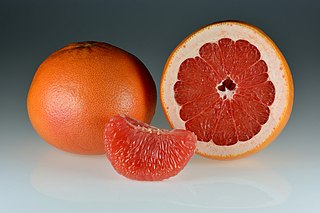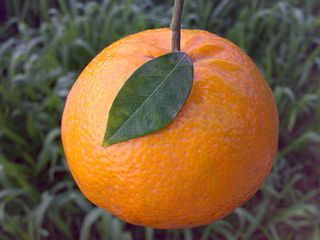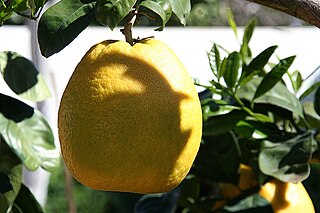
Kumquats, or cumquats in Australian English, are a group of small, angiosperm, fruit-bearing trees in the family Rutaceae. Their taxonomy is disputed. They were previously classified as forming the now-historical genus Fortunella or placed within Citrus, sensu lato. Different classifications have alternatively assigned them to anywhere from a single species, Citrus japonica, to numerous species representing each cultivar. Recent genomic analysis defines three pure species, Citrus hindsii, C. margarita and C. crassifolia, with C. × japonica being a hybrid of the last two.

Citrus is a genus of flowering trees and shrubs in the rue family, Rutaceae. Plants in the genus produce citrus fruits, including crops such as oranges, lemons, grapefruits, pomelos, and limes. The genus Citrus is native to South Asia, East Asia, Southeast Asia, Melanesia, and Australia. Various citrus species have been used and domesticated by indigenous cultures in these areas since ancient times. From there its cultivation spread into Micronesia and Polynesia by the Austronesian expansion ; and to the Middle East and the Mediterranean via the incense trade route, and onwards to Europe and the Americas.

Fragaria is a genus of flowering plants in the rose family, Rosaceae, commonly known as strawberries for their edible fruits. There are more than 20 described species and many hybrids and cultivars. The most common strawberries grown commercially are cultivars of the garden strawberry, a hybrid known as Fragaria × ananassa. Strawberries have a taste that varies by cultivar, and ranges from quite sweet to rather tart. Strawberries are an important commercial fruit crop, widely grown in all temperate regions of the world.

Calamansi, also known as calamondin, Philippine lime, or Philippine lemon, is a citrus hybrid cultivated predominantly in the Philippines. It is native to the Philippines, parts of Indonesia, Malaysia, and Brunei, as well as parts of southern China and Taiwan.

A plum is a fruit of some species in Prunus subg. Prunus. Dried plums are most often called prunes, though in the United States they may be just labeled as 'dried plums', especially during the 21st century.

The grapefruit is a subtropical citrus tree known for its relatively large, sour to semi-sweet, somewhat bitter fruit. The interior flesh is segmented and varies in color from pale yellow to dark pink/red.

The mandarin orange, also known as mandarin or mandarine, is a small, rounded citrus tree fruit. Treated as a distinct species of orange, it is usually eaten plain or in fruit salads. Tangerines are a group of orange-coloured citrus fruit consisting of hybrids of mandarin orange with some pomelo contribution.

The pomelo, from the family Rutaceae, is the largest citrus fruit, and the principal ancestor of the grapefruit. It is a natural, non-hybrid, citrus fruit, native to Southeast Asia. Similar in taste to a sweet grapefruit, the pomelo is commonly consumed and used for festive occasions throughout Southeast Asia and East Asia. As with the grapefruit, phytochemicals in the pomelo have the potential for drug interactions.

The loganberry is a hybrid of the North American blackberry and the European raspberry.

Yuzu is a citrus fruit and plant in the family Rutaceae of East Asian origin. Yuzu has been cultivated mainly in East Asia, though recently also in New Zealand, Australia, Spain, Italy, and France.

An orange, also called sweet orange to distinguish it from the bitter orange Citrus × aurantium, is the fruit of a tree in the family Rutaceae. Botanically, this is the hybrid Citrus × sinensis, between the pomelo and the mandarin orange. The chloroplast genome, and therefore the maternal line, is that of pomelo. The sweet orange has had its full genome sequenced.

Sweet lemon and sweet lime refer to groups of citrus hybrids that contain low acid pulp and juice. They are hybrids often similar to non-sweet lemons or limes, but with less citron parentage. Sweet limes and lemons are not sharply separated:
The sweet lime, Citrus limettioides Tan., is often confused with the sweet lemon, C. limetta Tan., which, in certain areas, is referred to as "sweet lime". In some of the literature, it is impossible to tell which fruit is under discussion.

The ponderosa lemon is a citrus hybrid of a pomelo and a citron. It is not the same as the 'Yuma Ponderosa' lemon-pomelo hybrid used as citrus rootstock.

The Kinnow is a high yield mandarin hybrid cultivated extensively in the wider Punjab region of India and Pakistan.

The jostaberry is a complex-cross fruit bush in the genus Ribes, involving three original species, the blackcurrant R. nigrum, the North American coastal black gooseberry R. divaricatum, and the European gooseberry R. uva-crispa. It is similar to Ribes × culverwellii, the jochelbeere, which is descended from just two of these species, R. nigrum and R. uva-crispa.

Citrus australis, the Dooja, round lime, Australian lime or Australian round lime, is a large shrub or small tree producing an edible fruit. It grows in forest margins in the Beenleigh area and northwards, in Queensland, Australia.

The cam sành or King orange is a citrus hybrid originating in Vietnam.

Reikou is a cultivar of tangor. It is a citrus hybrid of a hybrid of Kiyomi and Encore and Murcott tangor.

Citrus taxonomy refers to the botanical classification of the species, varieties, cultivars, and graft hybrids within the genus Citrus and related genera, found in cultivation and in the wild.

Kawachi Bankan, also called Mishokan and Uwa Gold, is a Citrus hybrid cultivated for its edible fruit.




















